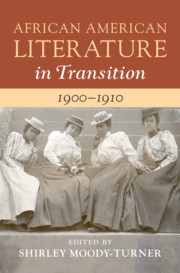Book contents
- African American Literature in Transition, 1900–1910
- African American Literature in Transition
- African American Literature in Transition, 1900–1910
- Copyright page
- Contents
- Figures
- Contributors
- Preface
- Acknowledgments
- Chronology, 1900–1910
- Introduction
- Part I Transitions in African American Authorship, Publishing, and the Visual Arts
- Part II New Negro Aesthetics and Transitions in Genre and Form
- Part III Modernist Masculinities and Transitions in Black Leadership
- Chapter 7 Charting the Tensions between Optimism and Despair at Mid-Decade
- Chapter 8 W. E. B. Du Bois and Transitions in Black Intellectual Thought
- Chapter 9 Celebrity and Transitions in Black Masculinity at the Turn of the Century
- Part IV Remapping the Turn of the Twentieth Century
- Index
Chapter 7 - Charting the Tensions between Optimism and Despair at Mid-Decade
from Part III - Modernist Masculinities and Transitions in Black Leadership
Published online by Cambridge University Press: 29 April 2021
- African American Literature in Transition, 1900–1910
- African American Literature in Transition
- African American Literature in Transition, 1900–1910
- Copyright page
- Contents
- Figures
- Contributors
- Preface
- Acknowledgments
- Chronology, 1900–1910
- Introduction
- Part I Transitions in African American Authorship, Publishing, and the Visual Arts
- Part II New Negro Aesthetics and Transitions in Genre and Form
- Part III Modernist Masculinities and Transitions in Black Leadership
- Chapter 7 Charting the Tensions between Optimism and Despair at Mid-Decade
- Chapter 8 W. E. B. Du Bois and Transitions in Black Intellectual Thought
- Chapter 9 Celebrity and Transitions in Black Masculinity at the Turn of the Century
- Part IV Remapping the Turn of the Twentieth Century
- Index
Summary
This chapter looks closely at 1906, an exceptional year in which the first half celebrated the achievements and progress in educational matters and race relations, while the second half was dominated by an increasing wave of racial discrimination, injustice, and unrest. In many ways 1906 can be seen as a pivotal year in the decade 1900–10, with the first half of it marked by African American achievements in literary production and expanded educational opportunities, while the second part saw the dramatic reentrenchment of racial antagonisms – as displayed in the Atlanta race riots and critical challenges within the ranks of Black leadership. Examining the Colored American Magazine, a New York–based Black monthly controlled, in 1906, by Booker T. Washington, and the Voice of the Negro, the more radical, Atlanta-based Black paper, as well as other Black newspapers and magazines, this chapter explores how a framework of blessings and disasters sheds light on turn-of-the-century developments in three critical, interrelated areas: literary production, education and school policy, and racial unrest.
Keywords
- Type
- Chapter
- Information
- African American Literature in Transition, 1900–1910 , pp. 175 - 198Publisher: Cambridge University PressPrint publication year: 2021

